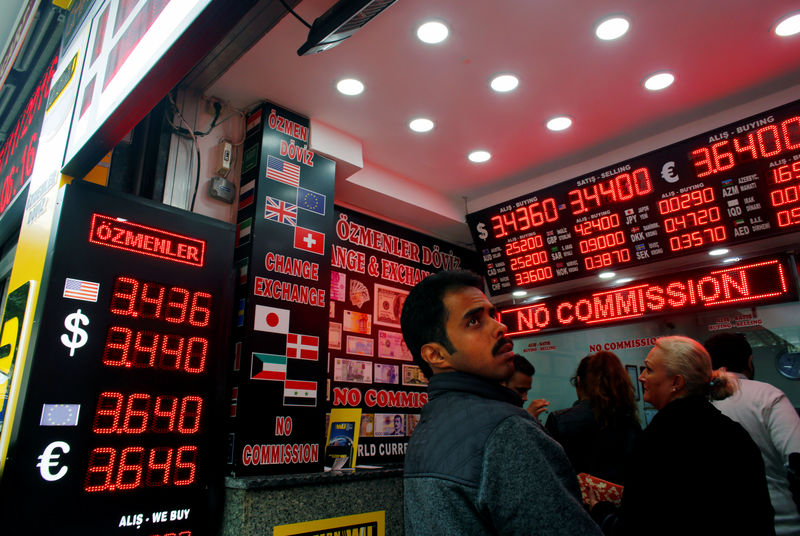By Karin Strohecker
LONDON (Reuters) - Turkey's repeated attempts to shore up the lira over the past year have left it perilously low on hard cash reserves as domestic households scramble to shift their savings to dollars and companies struggle to refinance their overseas debts.
The drain on the central bank's foreign currency buffers raises uncomfortable questions about Turkey's balance of payments and its ability to roll over foreign loans - and how and from whom it would seek emergency reserves if necessary.
The voracious domestic appetite for hard currency, meantime, has become a critical gauge of trust in the authorities' ability to manage the lira and the country's finance during the harshest economic contraction in a decade.
Data released last week showed gross FX reserves at Turkey's central bank dropped by some $3 billion to $73.78 billion in the week to March 15. Meanwhile total forex deposits and funds, including precious metals, of Turkish local individuals hit a record high of $105.74 billion.
"There are very few other countries whose level of FX reserves is as low as Turkey's," Paul McNamara, investment director at GAM in London. "With reserves down to this level, they really have no room for error and there is a lack of confidence, and that needs to be addressed."
The numbers weighed heavily on the lira, prompting Ankara's regulator to launch probes into a number of banks and blaming them for fuelling speculation with Turkish lenders reluctant to provide liras to offshore FX markets, pushing rates for foreign investors to punitive levels.
But the data itself showed more than just the low levels of reserves. It was also testimony to the role the central bank plays in the country ruled by President Tayyip Erdogan who takes a tough stance on the direction of monetary policy.
"It is a signal that the central bank is supplying part of the economy with FX reserves and not through the market," said Ulrich Leuchtman, head of FX & EM research at Commerzbank (DE:CBKG) in Frankfurt.
"That indicates that the exchange rate is an issue, and also that the central bank is meddling in economic policy, which isn't really what it should be doing."
Turkey's reserves look under pressure on several measures.
The International Monetary Fund (IMF), seen as the oracle on currency crises due to its vast experience in trying to put countries' finances back together, has developed a number of gauges to capture the resources a country has available to meet shocks.
According to the IMF, reserves to short-term debt ratio stood at just over 50 percent for Turkey at the end of 2018 while the fund's rule of thumb is that a ratio of 100 percent is adequate.
The picture looks somewhat different in calculations by the Institute of International Finance. The IIF estimated some $75 billion issued by government, banks and corporates is maturing in 2019, of which $17 billion is short-term, $59 billion medium to longer-term, and the rest made up of trade finance and non-resident deposits.
Turkey's import cover ratio - the number of months that imports can be sustained should all inflows seize up - stood at around four months, compared more than six months for South Africa or 18 months for Russia, according to the IMF.
Fresh FX reserve data due out in the coming days is expected to show some reprieve, but not necessarily for the right reasons, say analysts. As part of efforts to prop up the lira in the run-up to local elections on Sunday, the central bank suspended auctions at the one-week repo rate, forcing borrowers into higher interest rate windows - a move that is expected to add another $2.5 billion to reserves.
Meanwhile, locals' mistrust of their own policymakers as seen in their record holdings of dollars, gold and other safe haven assets have added to market jitters.
Countless emerging market crises have shown over the decades that it is not necessarily the withdrawal of foreign investors from a market but the drying up of central bank reserves and a flight of local households and businesses from a currency that are instrumental in its collapse.
"The concern has been dollarisation: It is not really foreigners leading the way, it is all about locals," said Tim Ash, senior emerging markets strategist at BlueBay Asset Management. "The actions they have taken takes foreigners out, but it doesn't really solve the problem with locals."
Rampant inflation dogged Turkey for decades before 2000 and has been back in double digits since the start of 2017. In February, inflation stood at just under 20 percent.
Meanwhile last August's 25 percent lira tumble of the lira has pushed Turkey into a painful recession.
Locals' appetite for hard currency shows little sign of abating. Mustafa Alkan, manager at a foreign exchange office in Istanbul, said demand has been high over the past three weeks.
"People are panicking - when the dollar increases, they panic and buy," he said, adding some customers had come with tens of thousands of liras in their pockets to his counter.
Many Turks were rattled by the lira's tumble last August to 7.24 to the dollar. The lira currently trades at 5.4.

"There is a view that the dollar will go back to the levels it saw (last summer)... As long as there is no value in the lira, people will flock to dollar."